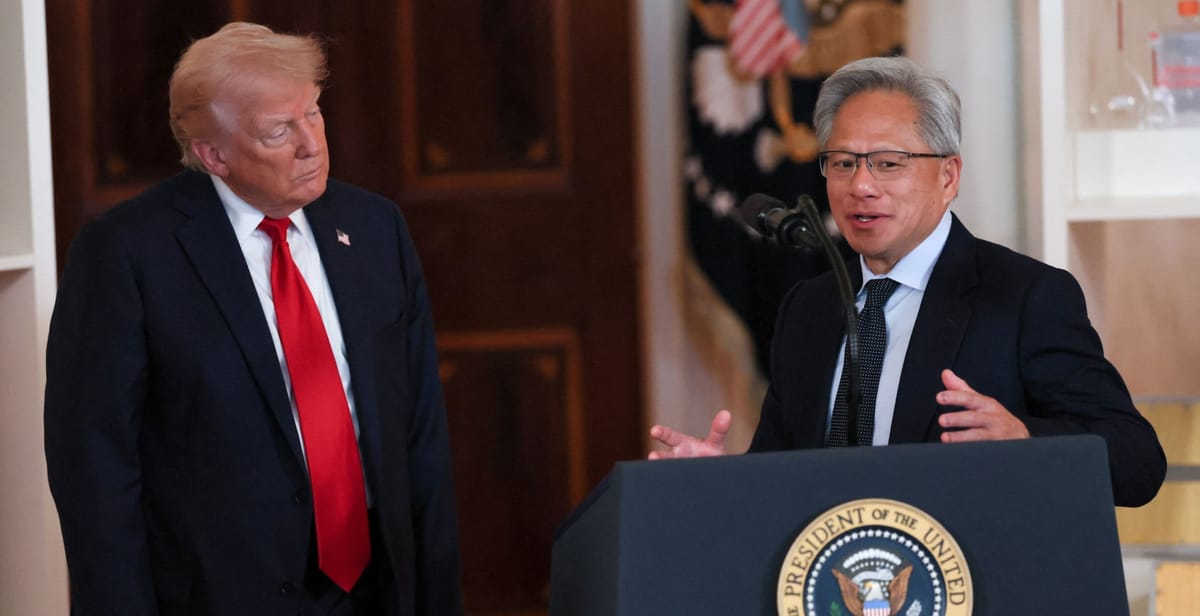Nvidia and AMD struck a rare agreement with the U.S. government—give up 15% of their China chip‑sales revenue, and you get permission to export.
Key Points
- Chipmakers will pay 15% of H20 and MI308 chip revenues to the U.S. government as a condition for export licenses
- The deal could generate over $1 billion quarterly for the government if sales return to previous levels
- Legal experts warn the arrangement may violate the Constitution's Export Clause, which prohibits taxes on exports
The deal emerged after NVIDIA CEO Jensen Huang met with President Trump last week, where Trump reportedly told him "I want you to pay us as a country something" for allowing the chips back into China. Trump initially wanted 20% but settled for 15%—what he called "a little deal."
Here's what makes this so unusual: The U.S. government doesn't normally take a cut of private companies' international sales. Trade experts are calling it unprecedented, and some constitutional scholars are already sharpening their legal arguments. The U.S. Constitution prohibits Congress from laying taxes and duties on articles exported from any state. Whether this revenue-sharing scheme counts as an export tax could spark a serious legal battle.
The chips at the center of this drama aren't even NVIDIA's best stuff. Commerce Secretary Howard Lutnick called the H20 NVIDIA's 'fourth-best chip'—a deliberately weakened version created specifically to comply with earlier export restrictions. The H20 has 296 TFLOPs computing power and a performance density of 2.9 TFLOPs/die, compared to the H100's 19.4 TFLOPs/die. Yet Chinese companies were desperate for them. ByteDance, Alibaba, and Tencent had reportedly placed $16 billion in orders before sales got blocked.
Why would Chinese companies want these nerfed chips? Because even a weakened NVIDIA chip beats the alternatives. The H20 actually runs 20% faster on large language model inference tasks than the flagship H100, despite having less raw power. Its 96GB of memory lets it handle massive AI models that domestic Chinese chips struggle with. And crucially, China's own chip industry can't match NVIDIA's production scale—Huawei's competing Ascend chips managed just 200,000 units last year versus NVIDIA's million H20s.
DeepSeek's recent AI breakthrough—which shocked Silicon Valley—was trained largely on these same H20 chips that we freely sold to China. Now we're letting them buy more, just with a 15% tax attached.
For NVIDIA and AMD, the math still works out. "From an investor perspective, it's still a net positive, 85% of the revenue is better than zero," as one analyst put it. NVIDIA lost $17 billion in China revenue last fiscal year (13% of total sales), while AMD took a $6.2 billion hit (24% of revenue). Getting most of that back, even with Uncle Sam taking a cut, beats watching Huawei eat their lunch.
But this creates a weird precedent. If the government can demand 15% of chip sales to China, what's next? "Will it stop with Chinese AI? Will it stop with controlled products? Will other companies be required to pay to sell into the region?" Bernstein analysts asked. Nobody knows.
The administration's strategy seems to be keeping China hooked on American tech while extracting rent. "You want to sell the Chinese enough that their developers get addicted to the American technology stack," Lutnick explained. It's a gamble that dependency creates leverage.
China's not thrilled, obviously. State media immediately started questioning the H20's security, warning about potential "tracking and positioning" and "remote shutdown" technologies. They're caught between needing these chips for AI development and knowing they're handing cash directly to the U.S. government with every purchase.
Both companies say it'll take months to restart production. AMD got its initial export licenses approved Monday. NVIDIA's working through applications now. Whether customers will pay the same prices knowing 15% goes to Washington remains to be seen.
The constitutional challenge seems inevitable. Trade lawyers are already pointing out that charging companies a percentage of export revenue looks exactly like the export taxes the Constitution explicitly forbids. The administration might argue it's a "user fee" for export licensing services, but 15% of revenue doesn't sound like any user fee in history.
"In the short term, the deal gives both companies some certainties for their exports to China. For the long term, we don't know if the U.S. government may want to take a bigger cut from their China business especially if their sales to China keep growing," one analyst warned.
What started as a national security issue morphed into a revenue stream. The chips that were too dangerous for China in April are suddenly fine in August—for a price. That's either brilliant realpolitik or a dangerous precedent for American business. Maybe both.

